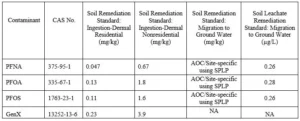The New Jersey Department of Environmental Protection (“NJDEP”) published interim soil and soil leachate remediation standards for PFNA, PFOA, PFOS, and GenX on October 17th. These interim remediation standards are effective immediately upon publication. PFNA, PFOA, PFOS, and GenX belong to a group of man-made chemicals called per- and polyfluoroalkyl substances (“PFAS”) that do not readily break down in the environment. For more than a decade, scientists have been studying the health effects associated with PFAS, and these emerging contaminants are subject to increasing regulation in jurisdictions across the country.
Riker Danzig will hold a webinar on November 17th to discuss these PFAS standards further and other new developments in site remediation practice in New Jersey.
New Jersey Pioneering PFAS Remediation Standards
New Jersey was the first state to adopt Maximum Contaminant Levels for PFAS that require statewide testing of drinking water systems for PFOA and PFNA. New Jersey also has promulgated Ground Water Quality Standards requiring investigation and remediation of PFOA, PFOS and PFNA in groundwater. With the adoption of the interim soil remediation standards this week, New Jersey becomes one of a handful of states to develop PFAS remediation standards for soil. The U.S. Environmental Protection Agency has not yet promulgated soil standards for PFAS.
NJDEP adopted interim remediation standards for PFNA, PFOA, PFOS and GenX for the Ingestion-Dermal Exposure Pathway. The Department also adopted standards for the Migration to Ground Water Exposure Pathway (both Soil and Soil Leachate) for each of these contaminants, except GenX, which does not have a standard for that pathway. Since generic Soil Remediation Standards for Migration to Ground Water could not be calculated, the Soil Remediation Standards for Migration to Ground Water are to be calculated on an Area of Concern (“AOC”) and site-specific basis utilizing the Synthetic Precipitation Leaching Procedure (“SPLP”). SPLP is already utilized in New Jersey to develop a site-specific impact to groundwater and soil remediation standards for contaminants other than PFAS. In the absence of interim standards for GenX for the Migration to Groundwater Pathway, the Department recommended that remediating parties delineate GenX to the laboratory reporting limit at this time.
The specific standards are listed below:

Potential Impacts of the Soil Standards
Even before the interim soil standards were adopted, Licensed Site Remediation Professionals (“LSRPs”) already had been required to perform an evaluation of whether PFAS have been used at a site. Where the evaluation documents the potential for the use or discharge of PFAS at the site, further investigation may be necessary.
Riker Danzig’s environmental attorneys will continue to monitor and report on these new developments. For more information, please contact any attorney in the Firm’s Environmental Practice Group.




